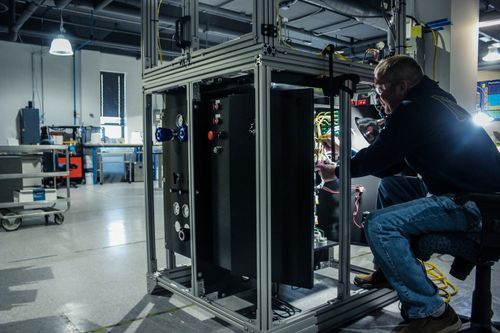Advanced Ionics is seeking to ramp manufacturing capacity and raise capital as it begins to commercialize an electrolyzer promising to reduce electricity needs, CEO Chad Mason said in an interview.
The Milwaukee-based company is working to demonstrate its low-cost electrolyzer technology through a partnership with the Repsol Foundation.
The technology will be tested locally, but could grow to include additional tests and, eventually, a commercial relationship with the Spain-based energy and petrochemical company.

Advanced Ionics is looking to move into a larger facility in Milwaukee to advance early-stage production of the electrolyzer, which uses steam from process and waste heat to reduce the amount of electricity required in electrolysis.
The company last year raised $4.2m in a seed round led by Clean Energy Ventures, with participation from SWAN Impact Network. It has also received financial support from Repsol and $500,000 from the DOE.
As it scales, Mason said, the company will also need to raise additional capital, but he declined further comment.
Going to market
The Repsol arrangement is part of the company’s early access program allowing potential end users to take a first look at the technology.
“Repsol is just the tip of the iceberg here,” Mason said. “We’re talking to some really amazing partners at some of the largest energy companies in the world. People who use hydrogen today and want to make it green immediately understand what we’re doing.”
Given the concentration of hydrogen use in petrochemicals and ammonia, Advanced Ionics is targeting these sectors for deployment of its electrolyzers to produce clean hydrogen, Mason added.
Mason noted that, as the traditional petrochemical industry dies off over time, it will be replaced by green materials and green fuels like sustainable aviation fuel and biofuels that require hydrogenation to be useable.
“You’ll see a bit of a replacement happening on the petrochemical side, towards a green chemical,” he said, adding that a third potential key market is green steel production using hydrogen.
Thermodynamically favored
The company’s Symbiotic electrolyzers use steam by tapping into excess heat from industrial settings, thereby lowering electricity needs for water splitting to 35 kWh per kg, with 30 kWh per kg possible. That compares to industry averages over 50 kWh per kg.

“We set out to build an electrolyzer specifically that would operate at intermediate temperatures,” he said. “And that allows you to have the synergy with those processes, and the downstream effect is the most cost-effective hydrogen you can get.”
The resulting hydrogen could be available for less than $1 per kg – but, Mason notes, the underlying power price math assumes an abundance of cheap, clean power. The models are usually pricing in two cents per kWh, the availability of which, Mason added, is “extremely geographically dependent.”
“If you’re in Texas, you have a system with wind, solar, and some amount of clean energy grid back-up, it’s pretty attractive,” he said. “Or if you hook up to a hydroelectric facility in the Northwest or in the Quebec area.”
Mason added, “Electrolysis rides on the coattails of cheap, clean electricity. What we have under our control is to make sure we’re using as little electricity as possible.”




